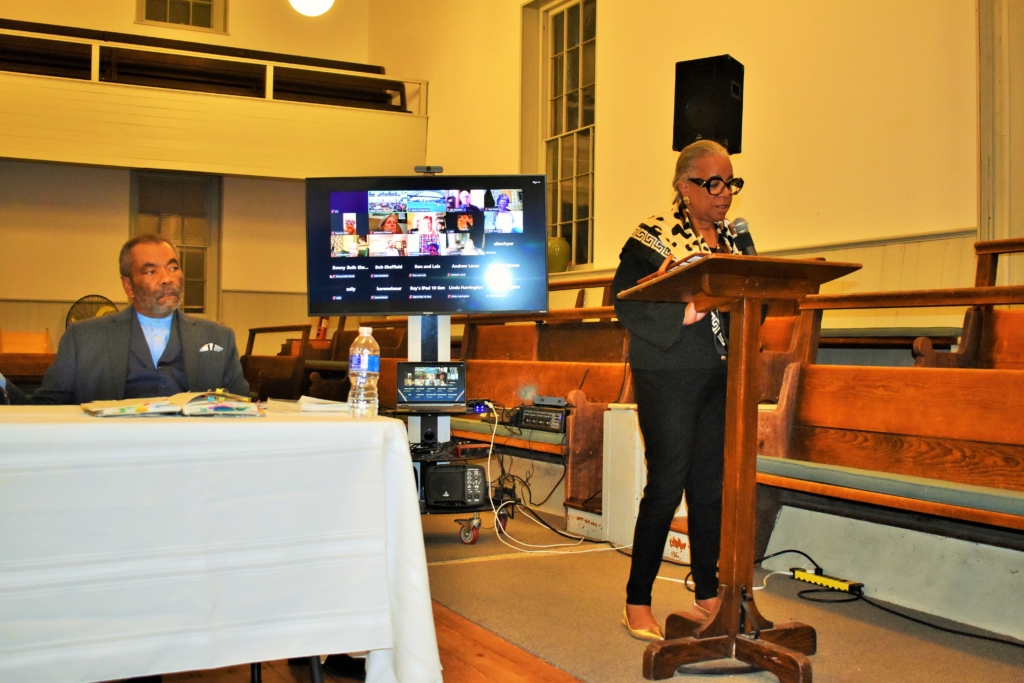
C. Adrienne Rhodes (right), founding president of the Preserving Black Haddonfield History Project, introduces guest speaker Dr. Maurice Jackson before his presentation, “Slavery, Abolition, and the American Revolution,” on Oct. 20 at the Haddonfield Friends Meeting.
More than 60 people sitting on 300-year-old benches gathered at Haddonfield Friends Meeting to learn from historian Dr. Maurice Jackson how many Quakers in South Jersey freed their slaves and supported abolition in the 18th century.
“We don’t assume that every Quaker was against slavery, but most of them were,” said Jackson, a professor of history and African American Studies at Georgetown University, pointing out that they had the choice of getting rid of slaves or not.
“The American Revolution was the very beginning of our society,” he noted. “I want to look at a central question of the ideas of the revolution and why some were achieved and why some were not achieved,” including, Jackson added, the words “All men are created equal” in the Declaration of Independence.
Jackson gave his presentation, “Slavery, Abolition and the American Revolution: Debates Rooted in Economics, Faith, Human Rights and Foreign Policies,” on Oct. 20.
Slavery had already existed in the early 1700s in Haddonfield and throughout the Colonies. In 1754, Friends had decided to take steps to end slavery within the Philadelphia Yearly Meeting of the Religious Society of Friends (Quakers) community.
At that time, John Woolman of Mount Holly and others were appointed to labor with Quaker families within the compass of Haddonfield and other Meetings regarding the importance of releasing people of African heritage from bondage through manumission, whereby masters free their slaves voluntarily.
When the Revolutionary War begin in 1775 Thomas Paine wrote the essay “African Slavery in America,” Dr. Jackson said about the author of “Common Sense” – which changed the minds of many Americans about declaring independence from England.
In the essay, Paine condemned the immorality of the slave trade and the institution of slavery itself and wondered how colonists fighting for their freedom could simultaneously enslave others. He stated that African people had a natural right to freedom.
Jackson also referenced “A System of Moral Philosophy,” written by Francis Hutcheson in 1755. “He argued that each person has the same rights. This had a ‘great impact’ on people’s thinking about the morality of slavery.”
Hutcheson stated that slavery was a violation of natural equality and universal rights, which challenged the accepted view that some people were naturally slaves and that a person could be reduced to property.
Jackson has written several books about African American history and is the co-editor of “Quakers and their Allies in the Abolitionist Cause, 1754-1808,” with local historian Susan Kozel. He had worked at the Newport News, Va., shipyard as a rigger and longshoreman and was a community organizer before going back to college.
Jackson said that Quakers approved a proposal in 1776 that “every slave who has a child would be freed as of age 21.” Plans included having the master act as the guardian and train the child for adulthood. In 1780, Pennsylvania Quakers approved a resolution for the gradual abolition of slavery.
His presentation was a project of the new “Coalition on Slavery, Abolition and the American Revolution” including: Haddonfield Friends, the Historical Society of Haddonfield, Indian King Tavern and Museum, the Lawnside Historical Society, and The Preserving Black Haddonfield History Project.
Before Jackson’s speech, Shamele Jordan of the Lawnside Historical Society explained that recent research has found the names of 101 of freed African American slaves within the compass of Haddonfield Meeting, which includes Deptford, Evesham Township, Gloucester Township, Haddonfield, Newton, Waterford and Woolrich.
According to South Jersey Manumissions, they include: Pedrow Hosee, Minee (Mulatto Girl), Rintha, Rose, Tab Jacobs, Anthony, Judith, Tobias, Dinah, Margaret, Jude, Bill Porter, Sarah Coleman, Hannah, Mary, Anthony Brannan, Candace Oliver, Jim Oliver, Nance Oliver, Betsy Oliver, James Oliver, Richard Dunkin, Jack, Hector, Primus, Lenah, Isaac, James Brian, Enoch, Atee, Suzanna Duncan, Cato, Julius, Batsheba, Ishmael, Cesar, Candice, Viney, Lydia, Winchester, James, Joseph, Belinda, Thomas, Jack, Judith, Levinah, Daff, Tenor, Sophia, Charles, Sip, Attee, Sambo, Rose, Tom, Betty Dinah, Attee, Hannah, Tenor, Attee, Hagar, Sam, Sara, Rintha, Marcy, Esther, Mina, Hannah, Aaron, Joseph, Bamuel, Tab, Violet, Franklin Howard, Venus, Att, Tab, Harry, Flora, Cato Stillwell, Boston or Berton, Tabby, Still, Poll, Hannah Peters, Hannah Dunkin, Thomas, Thomas, Jeremiah Newry, Tenor Waterford, Cuffee Cary, Fanny Smothers, Pero Fisher, Mina and Venus Fisher.
